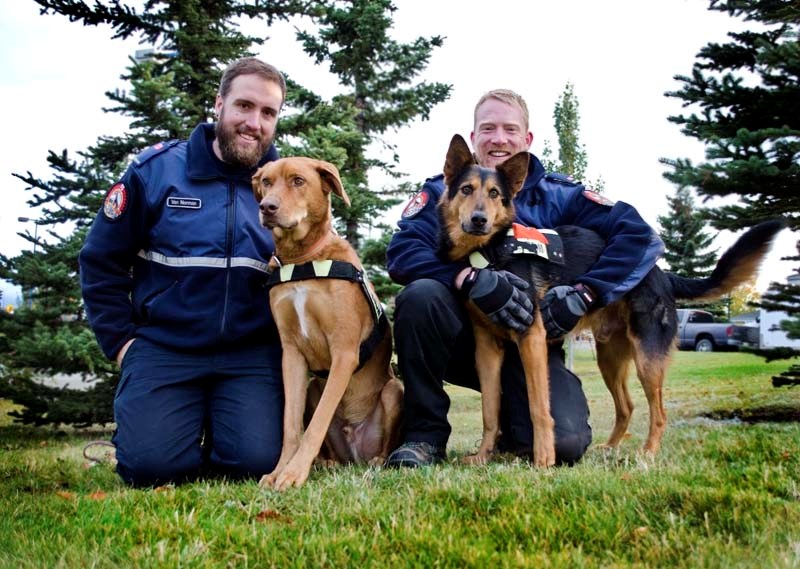Who let the dogs out?
The Search and Rescue Canadian Search Dog Association (CSDA) did.
Two dogs Harper, 4, and Took, 3, with their handlers Andrew Potton, president of Cochrane Search & Rescue and K9 handler, and Nathan Van Norman, CSDA trainer, will be frequenting Cochrane’s back alleys over the next couple of weeks as the dogs work toward their second year profile for the association.
“The first year we do missing peoples, articles and ditches. The second year validation we are working on back alleys and evidence,” Van Norman explained.
While Harper and Took will be working over the next couple weeks for the second year training certification, the dogs can often be seen around Cochrane, as training is an all-year process.
“We are always training … we train our dogs every night and train as a group two to three times a week … it is an ongoing never-ending process,” Van Norman explained.
The trainers also want to let the public know that despite public speculation the handlers put everything the dogs “find” out, and the items never include drugs.
“The reality is, we never go to people’s back gardens, everything we are finding we have put out – it is not drugs, the dogs wouldn’t even know what drugs are, they are not trained on it,” Potton explained.
“So if you are in the back alley and see us thundering toward you, just stay where you are – there is no need to move, the dogs are not aggressive in any way.”
The Canadian Search Dog Association is the only provincial certification to validate civilian dogs as search dogs through the RCMP.
“We get a lot of people contacting us saying they just got a dog and they want to do Search and Rescue – the reality is, it is a significant commitment, huge time commitment, huge financial commitment, huge physical commitment, and travelling across the province,” Potton said.
“A lot of people don’t realize the full extent of what this entails, it is not a hobby, it is more of a way of life and it dictates a lot of our personal lives.”
Civilian-trained search dogs work in partnership with Cochrane Search and Rescue (CSAR). The organization has been operating since 2001 with a volunteer base assisting with emergency services operating across the broad Cochrane region.
Both handlers, Potton and Van Norman, who are also Cochrane Search and Rescue volunteers, said they are always surprised to hear that the public assumes both organizations are provincially or federally funded, when in fact CSAR and CSDA are both volunteer-based organizations.
“I am constantly amazed that people think we are government funded or we get everything from the government – the commitment takes thousands upon thousands of volunteer hours to go out and ultimately save lives or bring closure to a family,” Potton explained.
“I think sometimes people think we do it because we get paid but the reality is totally different.”
The organizations are funded through a variety of fundraisers. The Canadian Search Dog Association hosts casinos every two to three years, and Cochrane Search and Rescue typically hosts an annual garage sales with help from community businesses.
After some discussion, search and rescue volunteers realized the time put into the garage sales were exceeding 500 volunteer hours and will be forgoing the fundraiser this year. Instead it will be one of the funding recipients of the Monumental Tournament of Aces.
“The Kimmett family was gracious enough to let us be the recipient this year. In the future, we will be looking at an annual dinner to let our members be involved and to get the community more involved,” Potton said.
Harper and Took are the only dogs in Cochrane certified through the Canadian Search Dog Association, both animals were rescued from shelters at young ages. The association lists 14 civilian search dogs and handlers on the website with one dog/handler team located in Airdrie and another one in Calgary.
“It is super intense, it is not a pleasant world at times but the dog world is always really good fun, (but) if your sole reason to join is to have a dog that can be classed as a civilian search dog then that is not the reason, Potton explained.
“You end up with a dog who is a nightmare at home, they want constant attention and if they don’t get it, they are taught to bark and tend to bark a lot – you have to work them all year round but they are good with people. I (joined) because I wanted to be part of the community and do something that I love.”
The other Cochrane-based handler agreed that training a civilian dog to be a search dog is hard work but Van Norman said it was a rewarding experience.
“I’m really big into the outdoors – I like to climb lots, fish lots and ski in the winter and I thought it was an awesome way to give back to the outdoor community and help out with people who go missing,” Van Norman said.
“We try hard to do everything professional, we are training all the time, keeping our skills at a high level, keeping our equipment upgraded – it is an ongoing process.”
Visit cochranesearchandrescue.org and canadiansearchdog.com to learn more.




